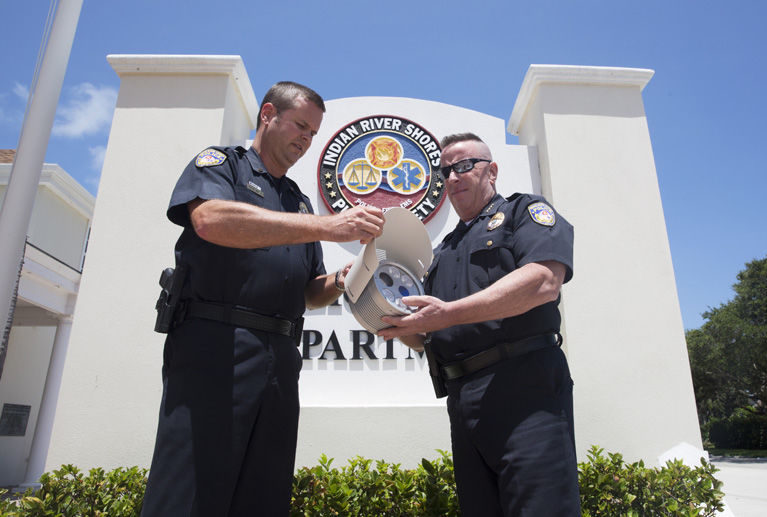
Two camera units capturing footage from two angles each were set to be installed Tuesday morning and to go live Tuesday afternoon, monitoring every vehicle license plate that goes in or out of the Town of Indian River Shores on A1A.
Public Safety Chief Rich Rosell pushed to have the cameras installed, citing their importance as a law enforcement and crime-solving tool.
Rosell completed a four-page draft policy, which was being reviewed on Monday, for the use of the cameras and the information they glean. It says the system is intended to help police “quickly develop suspects in crimes occurring in our town and identify violators of the law as soon as they cross into the town.”
Rosell has plans for another camera to be posted near the intersection of Jungle Trail and Old Winter Beach Road, so Jungle Trail does not become a back route for those trying to circumvent detection by the A1A camera system.
The cameras will read each vehicle tag number and run those numbers through a police interface. Any tag numbers that trip the system, based upon how the sensitivity levels are set, will pop up on the on-board computer of patrol officers and at central stations in the Public Safety Department.
“If an officer on patrol receives an alert regarding the presence of a vehicle which may be in violation of any statute or law, the officer, if operationally feasible, shall endeavor to locate said vehicle,” the policy states. But a hit from the camera system alone, say for an outstanding warrant or a revoked driver license, is not justification to pull a driver over.
“If an officer locates a suspect vehicle as a result of an alert from the Traffic Camera system, the officer shall confirm the nature of the alert prior to taking any police action. Officers will not automatically stop a vehicle based on an alert from the camera. They must corroborate the alert by running the plate themselves.”
“Officers involved in enforcement activities as a result of an alert from the camera must do so in a constitutionally compliant manner,” Rosell said.
The Town Council approved the $70,000 for the project back in November, based upon research and justification Rosell provided showing how the cameras have been used in other communities, and could be used in the unique enclave of the Shores to ensure it remains one of the safest places in Florida, despite its affluent residents and their property presenting tempting targets for criminals.
All images filmed by the cameras and tag search results will become public record as prescribed by Florida’s broad public records or Sunshine laws, and any photographic evidence used in the prosecution of a crime will also be subject to the laws of evidence.
One of the final items in the policy is intended to prevent any sort of abuse of the camera by officers or Town officials. “At no time shall the Traffic Camera systems be utilized for any politically-based or personal surveillance. Misuse of the camera systems shall result in termination,” the policy reads.
The system, scan results and the policy itself will be audited once a month, Rosell said.



